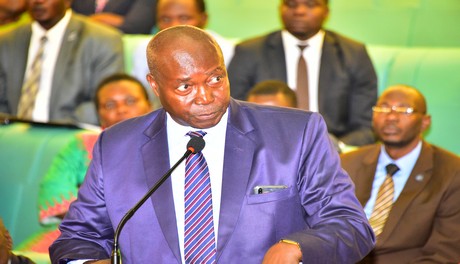MPs reconsider $200m loan request over local content

Posted on:
04 Jun 2018
A request to borrow up to US$200m from the Exim Bank of China suffered a hitch following intense criticism from Members of Parliament over local content.
MPs were first told by the National Economy Committee Chairperson Hon Syda Bbumba that 30 per cent of the loan meant to support rural electrification would make use of local content.
The position would later change after MP Nandala Mafabi (FDC, Budadiri West) said the project needs auditing to clear claims of runaway benefits to the Chinese at the expense of Ugandans.
Speaker Rebecca Kadaga postponed decision making on the matter pending clearing of the project’s nitty-gritties.
“We have substantially supported the economy of China for many years…I want us to refer this matter to tomorrow. We must know where the transformers [to be used for the project] will be coming from,” ruled Kadaga.
Kadaga also directed government to produce the list of over 280 beneficiary sub counties as an annexure to the motion for MPs’ scrutiny.
MP Odonga Otto (FDC, Aruu) cast the first doubt on the project, saying it is meant to satisfy the interests of deal-making cartels, accusing the Rural Electrification Agency (REA) of mortgaging the country.
“REA mortgaged the country to this single company [contractor], now it is turning around and it is going to borrow money basing on the same company from China. This is a deal to put us into the same situation we have with Umeme,” said Otto.
Otto said he is not opposed to the contract, but that the idea of having one contractor executing the contract throughout the country is unacceptable.
He instead proposed the zoning of the country, with each zone being managed by a different contractor.
The Minister of State for Finance (Planning), Hon David Bahati, said part of the framework between government and the Exim Bank is that the contractors are to use all local materials that can be obtained in Uganda.
He, however, said the issue of having a singular contractor at the time of obtaining the loan is a matter of law.
“We have conditions on how to deal with Exim Bank…it is our policy that all local materials are utilized by foreign companies working here. The issue of a singular contractor is a matter of law, but others may be subcontracted later,” said Bahati.
Kadaga said if one contractor is to do the work, then it will be a raw deal for the country.
“Is it true we are going to have one contractor? If that is true, then that is a raw deal for this country,” said Kadaga.
The Committee, in its report, approved the loan, saying $13m is counterpart funding and had urged MPs to provide for it in the ongoing appropriation.
The Committee recommended speedy implementation of the project to avoid having unutilised electricity by the country.
“In order to avert the potential risk of the country having idle installed capacity of over 900MW by 2020, implementation of this project is of paramount importance,” said Kadaga.
MPs were first told by the National Economy Committee Chairperson Hon Syda Bbumba that 30 per cent of the loan meant to support rural electrification would make use of local content.
The position would later change after MP Nandala Mafabi (FDC, Budadiri West) said the project needs auditing to clear claims of runaway benefits to the Chinese at the expense of Ugandans.
Speaker Rebecca Kadaga postponed decision making on the matter pending clearing of the project’s nitty-gritties.
“We have substantially supported the economy of China for many years…I want us to refer this matter to tomorrow. We must know where the transformers [to be used for the project] will be coming from,” ruled Kadaga.
Kadaga also directed government to produce the list of over 280 beneficiary sub counties as an annexure to the motion for MPs’ scrutiny.
MP Odonga Otto (FDC, Aruu) cast the first doubt on the project, saying it is meant to satisfy the interests of deal-making cartels, accusing the Rural Electrification Agency (REA) of mortgaging the country.
“REA mortgaged the country to this single company [contractor], now it is turning around and it is going to borrow money basing on the same company from China. This is a deal to put us into the same situation we have with Umeme,” said Otto.
Otto said he is not opposed to the contract, but that the idea of having one contractor executing the contract throughout the country is unacceptable.
He instead proposed the zoning of the country, with each zone being managed by a different contractor.
The Minister of State for Finance (Planning), Hon David Bahati, said part of the framework between government and the Exim Bank is that the contractors are to use all local materials that can be obtained in Uganda.
He, however, said the issue of having a singular contractor at the time of obtaining the loan is a matter of law.
“We have conditions on how to deal with Exim Bank…it is our policy that all local materials are utilized by foreign companies working here. The issue of a singular contractor is a matter of law, but others may be subcontracted later,” said Bahati.
Kadaga said if one contractor is to do the work, then it will be a raw deal for the country.
“Is it true we are going to have one contractor? If that is true, then that is a raw deal for this country,” said Kadaga.
The Committee, in its report, approved the loan, saying $13m is counterpart funding and had urged MPs to provide for it in the ongoing appropriation.
The Committee recommended speedy implementation of the project to avoid having unutilised electricity by the country.
“In order to avert the potential risk of the country having idle installed capacity of over 900MW by 2020, implementation of this project is of paramount importance,” said Kadaga.
